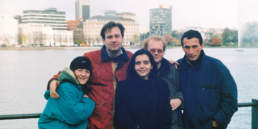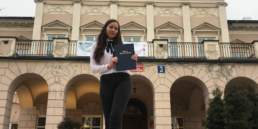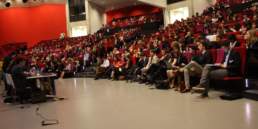For one CD member the Agora means returning home: Beáta Matuszka. The Golden Times asked her about her new life in Brussels and her expectations for the Agora.
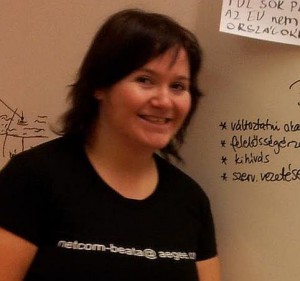
Golden Times: An Agora in your home city Budapest – you must be excited about it. How much were you involved in the application or preparations?
Beáta: I am extremely excited and I’m really proud of my local and the core team as I know how much effort they put in the organisation! Unfortunately we applied at the end of my board term, and after that I was focusing on Netcom, university and work therefore I knew that I couldn’t have enough time to focus on the organisation, hence I wasn’t involved that much. I just tried to help with the communication since I was their Netcommie.
Golden Times: Who had the idea to apply for the Agora?
Beáta: What I remember that it was a topic during my last board weekend but we weren’t that sure that time that we can do it. Then Marton came up with a more than a dozen pages long feasibility study which made us believe that AEGEE-Budapest can do it! Now, when I see all those e-mails on the organisers’ list, the presentations they make and the group pictures, I’m so glad that AEGEE-Budapest applied and I hope it’s going to have a huge impact on our local!
Golden Times: The interest from the network is huge. Which impact will the Agora have on network development in general and for AEGEE in the countries around Hungary?
Beáta: I saw in one of the Core Team’s e-mails that they are cooperating with neighbouring locals and it made me really happy to see this! As Budapest is a beautiful city in a central location and since AEGEE-Budapest is well-known for their great activities, I would have been surprised if we hadn’t got so many applications. I know that the organisers made a great effort to make the event as big as they can so they can involve the network as much as they can. The development of the Network however will depend on the involvement of the members, so I would like to encourage all participants, delegates, visitors and even extra official participants, to engage in discussions, meet with other AEGEEans and create new projects, start cooperations and develop ideas. If we do this in every Agora, soon we will have a much stronger AEGEE.

Golden Times: In Budapest there won’t be CD elections, but some big proposals. Can you name three that you consider especially important?
Beáta: I find the Summer University proposal extremely important, because if it’s accepted, it will not only offer a great possibility to increase the mobility of young Europeans but also the visibility of AEGEE in those regions in Europe where we are not presented. At this Agora we can also find proposals to improve the antenna criteria. Two will be really important to fine tune them, like the vital Activity Plan which serves as an introduction to the planning system approach in AEGEE and also it is needed for the General Subvention, the main financial support to our existence basically; or the proposal of the Audit Commission to improve the Financial Report criteria. Besides, there is a proposal from the Network Commission, which would like to support the improvement of the quality of the Network and also make the antenna criteria for the locals easier to understand and be more structured. These changes also intend to make the work of the Network Commissioners and the Network Director’s lives easier – such as using an application form instead of solely a motivation letter in the future, which would provide more and structured information about the future contacts which can be used not just in the first months but through the local’s lifespan.
Golden Times: Which other proposals should we take special interest in?
Beáta: The changes in the Juridical Commission would cause also interesting discussions.
Golden Times: What about the CD reform that was causing discussions in Enschede?
Beáta: Unfortunately, we could try out partly the Network based CD, and I can also tell from personal experience that it’s really hard to work like this and we are definitely missing the synergy which is continuously created in the house. Therefore this time we have decided not to follow this part of the motion, but we are taking into consideration other ideas present in the CD reform and implementing them – such as the Policy Officers.
Golden Times: Which part of the Agora are you looking most forward to?
Beáta: As it is my first Agora in this new role, I’m looking forward to the whole event, I hope that it won’t bring that much surprise and I can do my best from the very first second until the end of the Committees and Commissions meeting! I wasn’t prepared that I will miss my friends and this beautiful city that much, so beside the organisational part, I’m also really looking forward to meet with them again finally!
Golden Times: Let’s talk about your CD life. You started your term on 1st of September. Can you describe your feelings being in the CD?
Beáta Matuszka: I just recently started to realise what an amazing feeling it is being here in Brussels, being a CD member. My summer was extremely full of different kind of programmes, trainings, lectures and thesis writing, so I couldn’t really prepare. So actually it was the long anticipated deep water I splashed in in the end of July.
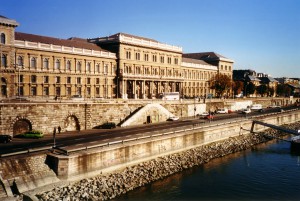
Golden Times: How was the transition period? Overwhelming?
Beáta: It was quite busy, we literally didn’t have time to sleep because the day was full of personal and team knowledge transfer. My predecessors were awesome, for instance Jüri Kirpu was willing to wake up hours earlier to be sure that I get all the necessary information. We also started the knowledge transfer right after the Agora, in order to not to let everything to the leave everything for the last month. It was a really smart decision, knowing the fact that I spent the last days of August in the hospital – without internet connection, this was the worst part for me actually. We also could prepare with the new team for the year, we discussed many things so we didn’t face the first days of September unprepared.
Golden Times: What are the best and worst parts about living in the house?
Beáta: The best part is definitely the team and the never-ending AEGEE spirit. I lived in a dormitory in the past five years, therefore I really need company – what I definitely get here. And I was really looking forward to not to do any other things besides AEGEE because I would like to focus on this favourite thing in my life. I don’t take the cold and the rain as the worst part, I lived in Wales, it was even worse there.
Golden Times: You are network and human resources director. Which geographical parts of the network need most attention?
Beáta: When I was a Netcommie, we already tried to focus on the Nordic region and the UK, we still would like to strengthen AEGEE in these areas. We already made steps, such as starting the cooperation with the law students association ELSA, which is strong in the Northern countries. Besides I will also attend the Network Meeting in Ogre and discuss the human resources issues there.
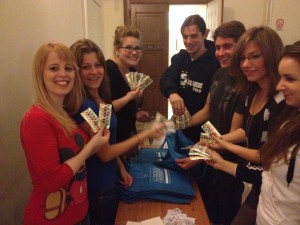
Golden Times: Which human resources issues?
Beáta: Unfortunately, I see the lack of human resources as a general problem in AEGEE, therefore I would like to help with the Network Commissioners to solve this situation on a European wide sense and also to enhance cooperation among the locals. The cooperation we can see in the Spring Agora organisers’ case is a great example, I’m really proud of them, I hope we will see other strong, even cross-border cooperations!
Golden Times: Which parts of the network do best?
Beáta: Many areas are doing well for different reasons, we can see that great projects are born from different parts of the Network. That’s what I find a real competitive advantage of our association, that the interdisciplinarity and diversity of our activities create enormous amount of choice where our members can be active and make the whole AEGEE so colourful and interesting!

